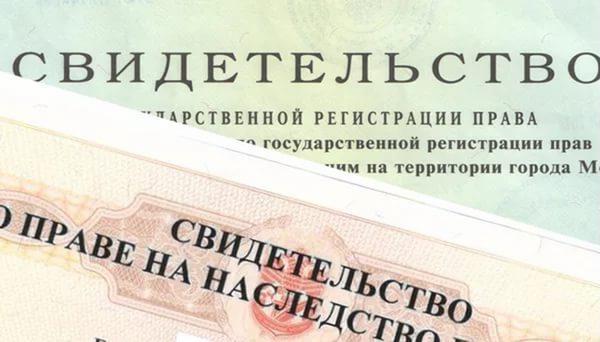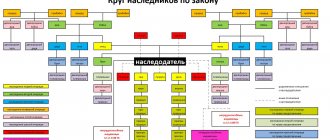What debts are inherited?
It does not always turn out that the parent leaves only his movable and immovable property as an inheritance - sometimes, “in addition” to the apartment, the heir receives a lot of debts. It is especially unpleasant when this becomes known after the death of a close relative. In such a situation, you need to put aside sentimentality and start solving the issues that have come to your head. So, are debts inherited by children? If so, how can you smooth out the situation and reduce its harmful consequences?
Let's start with the most important thing: in accordance with Art. 323 of the Civil Code of the Russian Federation, debts are inherited. But this is relevant only if the son or daughter of the debtor were, in relation to the debt obligations, joint and several debtors. In other words, they had to act as co-borrowers or guarantors for the loan.
In other cases, the debt is transferred in accordance with Article 1175 of the Civil Code of the Russian Federation. It not only gives an unambiguous answer on the topic of whether loans are inherited (yes, but with restrictions), but also additionally provides explanations on the topic of in which cases the transfer of debt obligations is permissible and in relation to which loans this is possible. Here is a list taken from the text of the law:
- Credit debts. This category includes all types of loans - credit cards, debit cards with overdraft, mortgages, consumer loans, etc.;
- Debts to individuals;
- Contractual debts arising from the conclusion of a contract of sale, lease or rental;
- Debt for utility bills and other housing and communal services;
- Tax debts, regardless of the tax for which the debt arose;
vAll kinds of penalties, commissions, fines and penalties. True, only those penalties that were accrued during the life of the debtor-testator are considered.
Entry into inheritance debts of the testator
» Inheritance disputes October 10, 2020
Are debts inherited?
Receiving an inheritance, regardless of what it is expressed in - vehicles, residential properties, foreign currency accounts, etc. may be accompanied by debts.
Unfortunately, some heirs may not know about their existence or believe that they are not obligated to repay the debts of the deceased citizen. Is it really?
You should know which debts need to be repaid and which debts are not covered by liability.
Who is responsible?
It is important that a citizen’s property obligations do not end with his death, but pass to the heirs of his property.
The only exception to the situation is personal debts, which is established by Article 418 of the Civil Code of the Russian Federation.
Consequently, it is the heirs who are responsible for the debts.
Personal debts include:
- alimony payment
- compensation for moral or material damage
- insurance compensations, etc.
- will be liable for debts within the limits of the value of the capital received
- will not be liable for the debts of the heirs from whom they received the right to the property.
- debts for utility bills
- payments due to unjust enrichment, etc.
- Personal obligations. These obligations are not transferred to heirs. Their main feature is an inextricable connection with the personality of the debtor. These may be alimony obligations, royalties, debts under an agency agreement
- Other obligations. Debts that arose as a result of contracts are assumed. Liabilities include not only the principal body of the debt, but also interest for late payments, penalties and other charges.
- To begin paying off debts, you must enter into inheritance rights. Read about the procedure for entering into inheritance according to the law here
- A person is liable for debts only to the extent of the inheritance that he received.
- If one of the followers has fully paid the debt, he has the right to claim part of the funds from other heirs
- If the amount of obligations exceeds the size of the inheritance estate, then the heirs will not be liable for the debts with their property.
Law
Article 1175 of the Civil Code of the Russian Federation establishes a provision according to which the transfer of the testator's debt occurs on a joint and several basis.
It follows from this that each heir to whom they arrive will be liable in the amount of the value of the property received.
Article 1156 of the Civil Code of the Russian Federation provides that heirs who have received the right to property in accordance with hereditary transfer:
Creditors of a deceased citizen have the right, provided for by law, to file claims against the heirs who accepted the property, but only taking into account the statute of limitations.
Before the inheritance has been accepted, creditors make claims against the property being inherited or against the person acting as the executor of the will.
Are they passed on to children?
Are debts inherited by children? Debts by inheritance are an integral part of the entire inheritance mass, therefore, together with the rest of the property, it passes to the heirs of the first priority - the spouse and children, as well as the subsequent ones.
Debts by inheritance
Article 1175 of the Civil Code of the Russian Federation equates obligations in the property area received from the testator to those received by the heir himself.
Such obligations can be expressed in different ways - as:
It is important to take into account that the debts of a deceased citizen will not include expenses associated with caring for him during illness, organizing a funeral and protecting inherited property.
How to find out about them?
The creditor, within six months from the date of opening the estate, has the right to submit a written claim to the notary's office about the need to repay property obligations.
Therefore, you can find out about debts by contacting a notary.
The creditor may file a corresponding claim in court, in which case the claims will be made against the estate, heirs or the executor of the will.
Cash
If there is a monetary debt confirmed by a receipt or other payment document, then it also falls on the heirs.
Its payment must be made under the same conditions as were established for the testator.
Without a receipt or other document confirming the monetary debt, the heir may not pay the funds.
If necessary, a statement of claim is drawn up in court to consider the circumstances of the case.
Credit
If the testator had a credit debt that he did not have time to repay, then repayment of the debt will be carried out on the basis of an agreement on the provision of a sum of money.
For example, if a simple consumer loan was issued, then the agreement concluded with a banking organization is taken into account.
The marital share of the inheritance is legally assigned to the surviving spouse.
How to receive an inheritance under a will? See here.
For utilities
If an apartment (house, room or other residential property) is transferred to an heir by law or by will, then the existing debts go along with this property.
The heir is obliged to pay them, since it is he who is responsible for these debts from the moment he receives the inheritance.
You can find out about them in advance by contacting the housing and communal services office, or by studying the payment history in accordance with receipts.
How does collection work?
Debt collection is usually carried out in court.
In this case, the judge makes a decision according to which the heirs must pay the amount of the debt, but he does not indicate that the debt should be repaid precisely at the expense of the living space.
Where the heirs will get the money from depends only on them.
A different situation arises if, during litigation, at the request of the creditor, the apartment is seized.
Then the apartment will act as a means of securing the debt. If the heirs do not pay it, the apartment will go to the creditor.
Distribution among heirs
If there is only one heir, then this issue is not considered.
If several people claim the property of the testator at once, then the question arises with shares.
Not all heirs receive equal shares; in accordance with the size of the share received, the part of the debts that they must pay is also determined.
The current legislation stipulates that the creditor has the right to make a claim only against one of the heirs or against all of them at once.
In this case, one of the heirs can pay the entire debt from the inheritance of the deceased citizen, and then demand compensation from the other heirs.
However, the amount due from them should not be more than the estimated value of the property received by inheritance.
How to avoid?
To avoid paying the testator's debts, it is necessary to find out before entering into inheritance rights whether there were any debts to the creditor.
If they are present, then their size is assessed, after which a decision is made - whether it is worth entering into inheritance rights or whether it is best to draw up a waiver, thereby freeing oneself from responsibility.
A sample statement of claim to establish the fact of acceptance of an inheritance can be used when drawing up a document.
How to enter into an inheritance after the death of a husband? Read here.
What rights to inheritance does a common-law wife have? Detailed information in this article.
Refusal
If the debt is disproportionate to the property received, then an appropriate solution would be to reject the inheritance.
This will allow you to avoid fulfilling debt obligations to one or more creditors. Moreover, this will resolve issues related to the costs and expenses of litigation.
It is important that property can be renounced only within six months after the opening of the inheritance mass.
The opening of property is carried out at the time of death of a person.
Consequently, if a creditor approaches the heir with a claim after he has accepted the inheritance, then it will not be possible to refuse it, so the debts of the testator will have to be compensated.
Video about transferring debt to heirs
Contacts
News
Question answer
Inheritance of debts. Debts by inheritance
It is not uncommon for heirs, when registering the inheritance of a relative or loved one, to forget about inheriting debts. Before registering an inheritance, you should find out information about the existing debts of the testator at the time of death. This is explained by the fact that the legislation provides that with the acceptance of an inheritance, inheritance of debt obligations occurs. The most common inheritance of loan debts. Inheritance of debt obligations under various transactions also often occurs in practice.
Inheritance of debts: general rules.
In accordance with Art. 1175 of the Civil Code of the Russian Federation, the heirs who accepted the inheritance are jointly and severally liable for the debts of the testator. That is, the creditor has the right to claim the debt from all debtors together, as well as separately, both the full debt and part of it. It is worth noting that the heirs are liable for the debts of the testator only within the limits of the accepted inheritance, within the limits of its value. If the size of the debts is greater than the value of the inherited property, it is more profitable for the heir to refuse the inheritance, thus avoiding the need to repay these debts. But at the same time, this is not always possible. The right to refuse inheritance is enshrined in Art. 1157 Civil Code of the Russian Federation. The heir has the right to refuse the inheritance in favor of others specified in Art. 1158 of the Civil Code of the Russian Federation. The refusal is issued by a notary within a six-month period and cannot be subsequently changed or taken back. When refusing an inheritance, you need to take into account that you will need to refuse the entire inheritance. Since Art. 1158 of the Civil Code of the Russian Federation does not allow refusal of part of the inheritance due to the heir; he will not be able to refuse the inheritance only in part, for example, in part of the debt. Thus, property obligations in the form of debt obligations are included in the inheritance, and when registering rights to inherited property, inheritance of debts is inevitable.
The subject of the above responsibilities can be various obligations, for example, debt for utilities, debt to the employer arising as part of the employee’s financial responsibility, debt incurred on a loan, tax debts, which are then paid by the heirs within the value of the inherited property.
In accordance with paragraph 16 of the Resolution of the Plenum of the Supreme Court of the Russian Federation No. 2c, claims on claims of third parties for recognition of ownership of property and reclaiming property belonging to them are not considered debts. Also, judicial practice does not classify as debt the costs of the testator’s funeral, provision during illness, and the costs of taking measures to protect the inheritance.
Inheritance of loan debts
Most often, after the death of the testator, when registering an inheritance, people are faced with the fact that at the time of his death there are outstanding loans issued during his lifetime in various credit organizations.
The death of the testator does not provide grounds for repayment of the loan, although, it would seem, by virtue of Art. 418 of the Civil Code of the Russian Federation, an obligation is terminated by the death of the debtor if fulfillment cannot be carried out without his personal participation, or the obligation is inextricably linked with the personality of the debtor.
But, as already mentioned, in view of Art. 1175 of the Civil Code of the Russian Federation, the heirs who accepted the inheritance are jointly and severally liable for the debts of the testator within the limits of the value of the property they received. It is also established that creditors have the right to demand debt from heirs within the limitation period, which is 3 years. Before accepting the inheritance, creditors' claims may be brought against the executor of the will or against the estate. This rule applies in cases where debts arose during the life of the testator, and claims were made after his death. If the testator died during the commencement of legal proceedings to collect the debt under the loan agreement, the statute of limitations is not updated. In such cases, the court simply replaces the deceased with his legal successor, that is, the heir who accepted the inheritance.
Frequent disputes in practice in the inheritance of loan debts are raised by the question of the legality of the bank's requirements to the heirs to pay interest for using the loan. as well as penalties accrued after the opening of the inheritance case. It would seem that after the death of the borrower, interest for using a loan by the bank stops accruing. But, as judicial practice shows, this point of view seems erroneous. Due to the credit legal relationship between the bank and the borrower, the accrual of interest for using the loan is legal.
A loan agreement with a bank always provides for a penalty clause. which also raises disputes. The position of the banks is that the obligation to pay under the loan agreement must be fulfilled from the moment the notary issues a certificate of inheritance rights, and, accordingly, in the event of a delay in repayment of the loan, the penalty begins to accrue at the same moment. The position of the courts on this matter turned out to be even more interesting. The decisions contain wording with the following meaning: the bank has the right granted by Art. 1175, in a claim procedure, demand from the heirs the fulfillment of obligations regarding the payment of the next installment on the loan. If this obligation is not fulfilled, the heir will have to pay a penalty from the moment the inheritance is opened.
When fulfilling obligations under debt obligations, if inheritance of loan debts occurs. Debt restructuring is possible as an attempt to reduce it. One of its options is to reduce the interest rate. But even in this case, there are certain subtleties, for example: if the bank decides to reduce the interest rate on the loan to the minimum amount, or even forgive the debt to the heirs, then the latter will receive a material benefit that is subject to taxation in accordance with Art. 212 of the Tax Code of the Russian Federation. Debt restructuring may also provide for a deferment or new installment conditions for the payment of amounts under the testator’s loan agreement.
Inherited debts are paid in proportion to the claims of creditors. If a claim for debt collection is addressed to several heirs, one of them has the right to fully repay the debt. In turn, based on the concept of joint and several liability, an heir who has paid the debt in full acquires the right of recourse to other heirs who are already liable to him as shared debtors.
To summarize, it must be said that with the acceptance of an inheritance, debts are inherited. Inheritance of debts and fulfillment of obligations under them is mandatory with the acceptance of the inheritance. Debt repayment is made within the value of the inherited property. The bank or collection agency has the right to demand payment of the debt within the limitation period. Before entering into an inheritance, the debt can be paid voluntarily, and after that - at the stated request of the creditor.
Responsibility of heirs for the debts of the testator: rules and laws
Are debts inherited? It depends on the type of debt. Some of them can be inherited, the rest cease to exist after the death of the debtor. The last type includes alimony obligations. The creditor has the right to make claims against any of the heirs. However, each of them is liable for the debts of the deceased in the amount of the inheritance share that he received.
The heirs who accepted the inheritance are liable for the debts of the testator, and therefore, before taking ownership, it is necessary to find out everything about the debts of the testator. If the amount of debt exceeds the amount of the inheritance, then the person can abandon the property.
Are the debts of a deceased testator passed on to his heirs?
The heir is liable for the debts of the testator depending on the type of debt:
Special rules apply regarding taxes. Immediate taxation ceases at the time of death of a person. However, if he has accumulated tax liabilities, the debts are transferred to the claimants of the deceased's property.
Taxation ceases at the time of the person's death.
Having a problem? Call a lawyer:
Moscow and Moscow region (toll-free call) St. Petersburg and Leningrad region
Liability for inherited debts under the articles of the Civil Code of the Russian Federation
According to the Civil Code of the Russian Federation, Art. 323, debts by inheritance are transferred to all heirs, regardless of how they received the property. Inheritance debts are legally distributed in accordance with the following rules:
Joint and several liability presupposes certain rights of the creditor. In particular, the creditor has the right to make claims for payment of the debt, both to all heirs and to one of them. In turn, this person can claim funds from other heirs if the creditor has made financial claims against him alone, and he has made all the necessary payments. If the remaining heirs have not made the required payments within the prescribed period, forced collection of obligations is possible.
Forced collection is possible if the heirs do not repay the debts within the prescribed period.
How do heirs respond to creditor claims under the law?
According to the Civil Code of the Russian Federation, the debts of the testator are paid in the established order:
- Expenses that arose as a result of the burial of the testator
- Amounts related to the protection of inheritance (in particular, this is the state duty paid to the notary)
- Funds for the execution of the will, for example, payment of the executor
- Other obligations to creditors.
If the deceased has funds left in bank accounts, the heirs have the right to withdraw them within six months and spend them on burial and burial.
The creditor has the right to present his claims even before the heirs have assumed their rights. To do this, he needs to fill out a financial claim and send it to the notary office at the place of residence of the deceased. The notary must register the claim. It is satisfied after the heir(s) have assumed their rights.
When drawing up and submitting a claim, you must follow some rules:
Inheritance of the debts of a deceased person requires that the notary notify the heirs of the receipt of claims from the creditor.
How are loan obligations transferred?
Debts on loans of the deceased are inherited, as mentioned above. This means that the heirs will have to make payments on the loans. The rule that applies to contractual obligations applies to them. Debts are inherited, in this case, with some features:
The debts of the deceased are transferred to the heirs on the original terms, and the bank does not have the right to change the terms of the agreement.
Can penalties and interest be inherited?
People do not always quickly find out about the loans of the deceased. During this time, the banking institution may charge penalties and interest for late payments. Is this legal? According to the law, pennies cannot be accrued from the date of death of the testator. However, this issue is extremely ambiguous. If a person believes that the accrued pennies are illegal, he can file a corresponding lawsuit in court.
Heirs who have not entered into inheritance in a timely manner are concerned with the question: how to enter into inheritance rights in a few years. This process is complicated, but worth a try. How to register an inheritance after death, read here. The main task is to do everything on time and correctly.
Can debts be transferred if there is no inheritance?
If you do not enter into an inheritance, the debts will not be transferred. For this reason, before applying for inheritance rights. it is necessary to find out whether the deceased has debts and their size.
Another question that worries many: what happens if there is no inheritance, but there are debts after the deceased? The creditor can make his claims in an amount similar to the size of the inheritance estate. If it is zero, then there can be no claims on the debt. However, in this case, there is simply no point in entering into inheritance rights.
Transfer of debts by inheritance under Art. The Civil Code of the Russian Federation can be prevented only in two ways:
Watch the video about the possibility of filing claims against heirs for the debts of a deceased testator:
Are debts inherited by the children of the deceased? Definitely yes, but not all. Persons who received property by law or by will are liable for the debts of the testator. Children will be required to make payments on debts only when they have entered into inheritance rights in any order.
It is impossible to accept an inheritance without renouncing the debts of the deceased. For this reason, before entering into rights, you should check the existence of the obligations of the testator.
For additional information on this issue, please refer to the section “Entering an inheritance” by following the link.
Free legal support by phone:
Moscow and Moscow region (toll-free call)
St. Petersburg and Leningrad region
Attention! Due to recent changes in legislation, the legal information in this article may be out of date!
Our lawyer will advise you free of charge.
It often happens that after the death of a person, not only property of some value remains, but also debts. In this article we will answer the question of whether debts are inherited and how the heirs are responsible for them.
So, are debts inherited?
Yes, but not always. With the death of the debtor, those obligations are terminated, the fulfillment of which cannot be carried out without the personal participation of the debtor or which are otherwise inextricably linked with the personality of the debtor.
For example, heirs do not have to pay alimony for a deceased relative. The heirs are also not liable for damage caused by the testator to the life or health of third parties.
In other cases, the heirs are liable for the debts of the testator. And these are debts on loans, loans, contracts for the purchase of any property, and so on. In this case, debts include the amount of the principal debt, as well as interest, penalties, and fines accrued on the date of death of the testator.
To what extent are the heirs liable for debts?
The heirs are liable to the extent of the value of the received share in the inheritance. Thus, the heir is liable for the debts of the testator only if he accepted the inheritance.
For example, the entire inheritance consists of an apartment. There are two heirs, they accepted the inheritance - half of the apartment each. The bank filed a claim against the heirs for the debts of the testator in the amount of 3,000,000 rubles. In this case, the court is obliged to establish the value of the apartment on the date of death of the testator. If the cost is 4,000,000 rubles, that is, it covers the debt of the testator, then 1,500,000 rubles will be collected from the heirs.
If the cost of the apartment turns out to be less than the debt, for example, 2,000,000 rubles, then 1,000,000 rubles will be collected from the heirs.
Thus, the heirs should not give away more than they received. But, you see, the goal should be to give as little as possible. In a lawsuit, it is extremely important to correctly correlate the value of the inheritance received and the transferred debt. And this is the task of a lawyer. representing the interests of the heir.
How is debt collection done?
Let's continue the example with an inherited apartment. In a decision on debt collection, the court cannot oblige the heirs to repay the debt at the expense of the apartment. He will simply charge the appropriate amount. Where the heirs will take it from depends on them.
At the same time, it is possible that already during the trial, the testator’s creditor will ask the court to seize the apartment as security for the claim. In the future, this arrest will play the role of ensuring the execution of the court decision. If the heirs do not pay off the debts of the testator, foreclosure will be imposed on the apartment.
Distribution of responsibility for debts among heirs
If there are several heirs who accepted the inheritance, then they are jointly and severally liable for the debts of the testator. This means that the creditor will be able, at his discretion, to file a claim against all heirs or one (several) of them at once, for the entire amount of the debt or for some part of it.
If everyone has filed a claim, as a rule, no questions arise. It is more difficult if the claim is filed against one heir and for the entire amount. The debt will be collected from him in full. Then such an heir, who has fulfilled the joint and several obligation, will have the right of recourse to the remaining heirs in equal shares, minus the share falling on himself. This is already a separate process.
How to find out about the debts of the testator?
The testator's creditor, within six months from the date of opening of the inheritance, may file a claim with the notary at the place of opening of the inheritance. Thus, you can find out about debts from a notary. But the creditor has no obligation to file such claims.
The creditor may file a claim in court. Moreover, before the heirs accept the inheritance, if the creditor is in a hurry not to miss the statute of limitations. claims may be brought against the executor of the will or against the estate.
What does knowledge about the testator's debt give to the heir? If the debt is commensurate with the inheritance received, it may be advisable for the heir to refuse the inheritance in order not to incur costs associated with court proceedings and repayment of the testator's debt. But such a refusal is possible only within six months after the opening of the inheritance (death of the testator). Therefore, if the creditor filed a claim against the heir who accepted the inheritance only after the expiration of the specified period, then it will no longer be possible to refuse the inheritance and the testator’s debts will have to be paid.
Similar
Often, contracts stipulate strict sanctions for failure to fulfill obligations, including high percentages of penalties. When it comes to&hellip
Is the guarantor responsible? If the debtor dies, is the guarantor liable for the unfulfilled obligation? There is no clear answer to this question. And in many ways...
How to divide property that is in shared ownership? This question is inevitably faced by co-owners of apartments, land plots, houses and transport...
Please tell me what to do in such a situation. My father had a bank loan in the amount of 600,000 thousand rubles. He repaid the loan in the amount of about 150,000 thousand rubles, but he recently died suddenly. My father owns an apartment which I am going to inherit. The notary told me that my father's debts would be assigned to me. Is it so? My sister, having heard this, decided not to enter into the inheritance. It turns out that if I declare my right to inheritance, then I will pay the remaining 450,000 thousand rubles? Or are there any options? Is it actually possible to inherit and not pay your father’s debts? Thank you in advance.
Should I enter into an inheritance if the testator has debts?
After the death of a person, his heirs share not only the property, but also the debts of the deceased, which may include obligations to repay a loan for a large amount. You cannot accept an inheritance in part by renouncing the debt portion. You will have to either refuse completely, or take possession of the property and undertake obligations to repay debts.
The inheritance includes all the property of the deceased that belonged to him on the day of death: this can be both movable and immovable property, cash, deposits, as well as debt obligations. If during his lifetime a citizen took out a loan from a bank that was not insured in case of death of the borrower, then in the event of death, his heirs will have to pay off the debts (Article 1175 of the Civil Code of the Russian Federation). Moreover, their liability is limited to the market value of the inheritance (Article 416 of the Civil Code of the Russian Federation). That is, if the debts exceed the value of the testator’s property, then the heirs will not pay additional funds from their own pockets that are not enough to pay off the debt.
It is important to know that it will not be possible to reduce the market value of the inheritance in any way in order to proportionally reduce the debt obligations. In accordance with paragraph 61 of the Resolution of the Plenum of the Supreme Court of the Russian Federation dated May 29, 2012 No. 9, the value of the property transferred to the heirs, the limits of which their liability for the debts of the testator is limited, is determined by its market value at the time of opening of the inheritance, regardless of its subsequent change to the time of consideration of the case by the court. Therefore, it is easier to refuse an inheritance in which there are more debts than property on the basis of Article 1157 of the Civil Code of the Russian Federation. But you will have to refuse completely; the law does not allow the heir to refuse part of the will - you cannot inherit, for example, an apartment and refuse the obligation to repay the loan.
On the issue of joint liability
If the deceased debtor has several heirs who agreed to accept the inheritance by will or by law, then they will be jointly and severally liable for his debts. This means that the bank, demanding the fulfillment of debt obligations, has the right to file a claim in court and name all heirs as defendants in the claim. In this case, everyone will be responsible in full, that is, even if one of the heirs pays off the entire debt, he has the right to recover from the other heirs what was paid (with the exception of his share of the debt) by way of recourse (Article 325 of the Civil Code of the Russian Federation).
Is it possible not to pay debts?
The debt of the testator may be recovered from the heirs who accepted the inheritance in court. The limitation periods for the claims of the testator's creditors continue to run in the same order as before the opening of the inheritance. Creditors' claims may be presented during the remainder of the limitation period if this period began to run before the opening of the inheritance. For creditors’ demands for the fulfillment of the testator’s obligations, the deadline for fulfilling which came after the opening of the inheritance, the limitation periods are calculated in accordance with the general procedure (clause 59 of the Resolution of the Plenum of the Armed Forces of the Russian Federation of May 29, 2012 No. 9).
Having become a debtor, the heir must pay the debt and interest on it, if we are talking about a bank loan. Moreover, you will have to pay not from the date of acceptance of the inheritance, but from the day of its opening, that is, from the day of the death of the testator. For failure to fulfill these obligations, the debtor-heir may also be charged interest payable in accordance with Article 395 of the Civil Code of the Russian Federation. The final amount of debt to be collected from the heir is determined at the time the court decision is made.
It is important to know that if a creditor delays the process of presenting demands to the heirs for the fulfillment of debt obligations, without having good reasons for this, then the court, on the basis of Art. 10 of the Civil Code of the Russian Federation will refuse to collect late interest for the entire period from the date of opening of the inheritance, since the heirs are not required to know about the debt obligations of the testator and, accordingly, be responsible for the dishonest actions of creditors.
Sources: nam-pokursu.ru, oformit-nasledstvo.ru, napravah.com, www.vvcl.ru, lawyer-33.ru
Next
Entering into an inheritance after death without a will, price in Ukraine
No comments yet!
Share your opinion
You might be interested in
Where to go to enter into an inheritance after the death of a father without a will
Which relative has the right to inherit after the death of a brother?
Can an heir under a will refuse part of the inheritance?

State duty on inheritance who is exempt
Popular
How a car is divided by inheritance (Read 22)
Can bailiffs take away an inheritance (Read 21)

Address certificate of the Federal Migration Service for inheritance (Read 20)
Inheritance after the death of a divorced spouse (Read 20)
How are credit obligations inherited?
Inheritance of debt arising as a result of lending to the testator is separately prescribed in the relevant chapter of the Civil Code of the Russian Federation.
Are credit debts inherited after death? Such a debt is transferred only if during his lifetime the testator regularly paid both the principal amount of the debt, the interest on the loan, and all the accompanying fines and commissions, if any. Then, unfortunately, the heirs, along with the rest of the inherited property, will have to take responsibility for the loans.
But this can be avoided if, in accordance with Art. 321-326 of the Civil Code of the Russian Federation, three conditions were met:
- The loan transferred to the heirs was issued not only to the debtor himself, but also to the guarantors/co-borrowers;
- In no case should these guarantors be the heirs themselves, otherwise they themselves will become joint and several debtors;
- During the life of the testator, claims were filed against him due to non-payment of loan obligations. It is important that these claims are satisfied and that the bailiffs begin collection.
If all three conditions are met, creditors will not have the right to demand repayment of the debt from the heirs. By law, debts must be paid by joint borrowers, i.e. guarantors and co-borrowers.
Are debts inherited?
Many people think that when they receive an inheritance after the death of close relatives, they have nothing to do with their unpaid debts, and the overdue loan will be written off. In reality, none of this is true.
The process of entering into inheritance falls within the legal framework of the Civil Code of the Russian Federation. Article 1175 of this legislative act provides for the responsibility of the heirs for the debts of the testator in terms of repaying the debt of the deceased, who executed a will in their favor.

In addition to personal property (real estate, cars, money, shares, etc.), the estate of the deceased also includes his debt obligations. The Civil Code of the Russian Federation does not explain the very concept of debt of the testator, but by reading individual articles of the code, you can understand whether debts are inherited. Check out the list of things you may have to pay for:
- overdue loans;
- unpaid microloans issued by microfinance organizations;
- payments under life annuity or lease agreements;
- documented debts to individuals;
- late utility bills;
- obligations under concluded civil transactions;
- tax debt;
- various fines or penalties accrued to the testator during his lifetime.
What debts are not transferable?
Contrary to popular belief, the testator does not transfer all debts upon his death. In Russian jurisprudence, there is a separate concept of “inalienable debts,” which denotes those obligations that relate only to the person himself. They, by virtue of their definition, cannot be inherited. For example, such obligations include the following categories of debt:
- Alimony;
- Material compensation for damage caused to the health and property of third parties;
- Debts to third parties that do not have any documentary evidence (agreement, receipt, receipt);
- Material compensation for moral damage caused;
- Penalties under agreements - if this agreement is not a loan agreement;
- Other debt obligations related only to the debtor himself, but not to the heirs.
Limits of heir's liability for debts
Regardless of the reason for entering into inheritance - whether by will or law - if there are several heirs, property and debts are divided according to a certain principle. Briefly it can be described as follows:
- Accepting an inheritance does not tolerate compromise. The heir can either formalize a complete renunciation of all inherited property and debts, or accept everything due to him;
- All heirs become joint and several debtors, so when regulating disputes, judges and creditors begin to be guided by Articles 321-326 of the Civil Code of the Russian Federation;
- The law prohibits the payment of debts in excess of the share that was inherited by the debtor. Moreover, the creditor does not have the right to demand directly from the heir his property in payment of the debt. This means the following: if the heir received 500,000 rubles as an inheritance and 1 million rubles in the form of debt, creditors will be able to demand only 500,000 rubles from the heir .
Attention: if one heir has paid off the debts for everyone, he has the right to demand payments from his joint and several co-debtors to fully reimburse the “surplus” paid. Such payments are made by way of recourse.
The nuances of inheriting debts to minors
Even a minor heir is required by law to inherit if he is entitled to a share. True, if debts are transferred along with the property, in accordance with Art. 28 of the Civil Code of the Russian Federation, the child’s parents are required to make payments.
The absence of parents does not exempt from inheritance, because in this case, the child’s guardians or trustees assume responsibility.
In addition, if desired, the child’s legal representatives have the right to completely refuse the inheritance received by the child. To do this, you will first have to obtain written permission from the guardianship and trusteeship authorities. After this, you can write a standard written refusal of inheritance.
How does collection work?
Almost always, collection is carried out through litigation and, later, enforcement proceedings. However, it is not always possible to involve bailiffs.
The judge, based on the results of the litigation, determines how much each heir must pay to creditors. However, he does not approve the payment procedure. This means that, for example, when inheriting an apartment and debts, the heirs will not be obliged to sell the home in favor of the debt - if they wish, they will be able to pay off the debt with their own money.
But lenders are different. Some of them require the court to secure the loan. In this case, the apartment is seized - it can neither be sold, nor given as a gift to anyone, nor exchanged for other housing. In case of failure to fulfill obligations to the creditor (within the time period established by the judge's decision), the housing is transferred to his favor.
Is it possible to refuse an inheritance with debts?
Unfortunately, in some cases, inheritance is more of a headache than it's worth. This happens in cases where the debt “eats up” all or most of the inherited property. Then you urgently need to look for an answer to the question of how to avoid inheritance debts.
In all situations, without exception, either the heir himself or his legal representative (if the heir is a minor) has the right to refuse inheritance. To do this you need:
- Within six months from the date of the start of the inheritance procedure, you must write a statement in any form about renunciation of the rights of the heir. It is possible to issue a refusal even if the heir learned about the debts after entering into the inheritance; the main thing is to have time to submit the application within six months;
- The document should be certified by the notary who took over this inheritance matter;
- Depending on the wishes of the applicant, the alienated inheritance rights can be transferred to a specific heir, or to the general inheritance property;
- Of course, indirect refusal of inheritance by ignoring the possibility of entering into it is also allowed. But this option is less reliable. To protect yourself from a legal point of view, it is better to issue a refusal.
That's all. If all the heirs formalize the refusal, the property along with the debts will be transferred to the municipality, which, in turn, will begin to regulate the dispute.
Transferring a debt to an insolvent person, such as a spouse
If the deceased took out a loan or a loan during the marriage, then according to current legislation, half of such a loan is considered the debt of the second spouse.
And if he does not have property and sufficient means of subsistence besides a pension, then it will be beneficial for the family to accept the inheritance, for example, by children or other relatives, while the spouse must refuse the inheritance. Under these circumstances, creditors will be able to ask the heirs for only half the amount of the debt, the other half will fall like a dead weight on the pensioner who refused the inheritance. Heading:
entry into inheritance inheritance
- Oleg Sukhov, lawyer, founder of the “Legal Center of Lawyer Oleg Sukhov”, President of the Guild of Lawyers of the Real Estate Market
How to check for debts before accepting an inheritance?
Previously, checking debt was so difficult that most heirs preferred to take a risk and check the debt obligations of a deceased relative upon receipt of the inheritance. But since 2014, when amendments were made to Federal Law No. 218 “On Credit Histories” dated December 30, 2004, everything has changed.
According to paragraph 6 of Art. 6 of Law No. 218, notaries involved in inheritance matters now have the right to contact the National Bureau of Credit History to obtain an extract. This is how the hereditary mass of the deceased is checked. NBKI is obliged to provide the notary with an extract within 3 working days from the date of application.
So, to check the existence of debts, you just need to ask a notary to check the information in the NBKI. In the vast majority of cases, he will do this himself without your requests, but this does not always happen - it would not be a bad idea to play it safe. This way you will receive sufficient information about the debt burden of the testator, based on which you will be able to determine whether it is worth entering into inheritance or not.
Can a minor inherit a debt?
According to the legislation of the Russian Federation, a person who has not reached the age of majority has the right to be an heir both by will and by law. Thus, if the deceased indicated a minor in the will, upon entering into an inheritance, this citizen will also inherit the debts of the testator.
However, in the case of minors, there are several additional circumstances, namely:
- on behalf of a person who has not reached the age of majority, his official representatives can also enter into an inheritance (these may be legal parents, trustees or guardians);
- if a person is under 14 years old, the application for inheritance must be submitted by the mentioned representatives;
- if a person is over 14 but under 18 years old, he must apply independently, but only with the consent of an authorized representative.
It is worth noting that in certain situations, a minor may enter into an inheritance without the consent of their elders. This concerns the procedure for actually acquiring rights under the law - it is only necessary to fulfill certain requirements that are necessary for such inheritance. In addition, if a dispute arose between the heirs regarding the division of property or they decided to sign an appropriate agreement, all documents must be submitted to the official representative of the minor.









